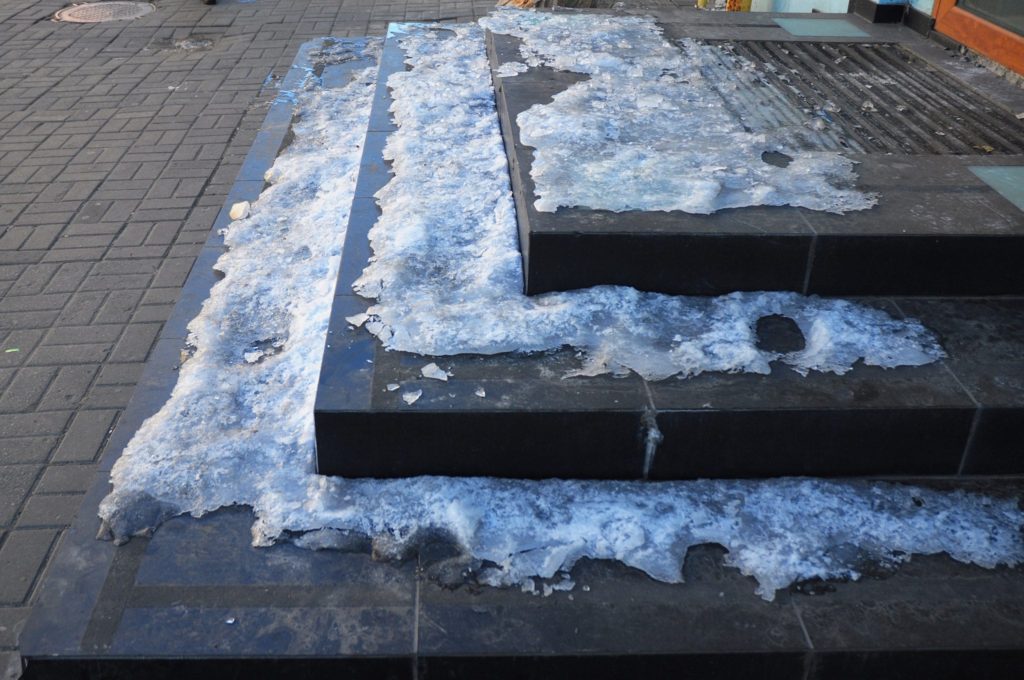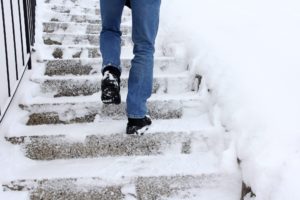Is a shopkeeper liable for your injury if you slip and fall on their property?

It’s a busy time of year for many of us, full of holiday errands and going from store-to-store shopping for gifts. And while holiday cheer is on our minds, nothing puts a damper on the joy of the season like a slip-and-fall injury. If you’re lucky, if you happen to trip or stumble you can simply pick yourself up, brush yourself off, and be on your way. But for the unlucky among us — about one in five — a fall results in a serious injury, such as head trauma or a broken bone.
Which prompts the question: when a slip-and-fall accident occurs, who is liable for the injured party’s damages? Many people assume the fault automatically lies with the property owner or business owner if they are injured on their premises, but that may not always be the case. The owner does generally have the responsibility for maintaining safe conditions on his or her property, but at the same time each and every one of us also has a responsibility to be mindful of where we are going, and to exercise reasonable caution as we go about our day-to-day activities. Sometimes, especially in cases of falls in public parking lots (which are common), the property or business owner may not be the only party with potential liability, as they may have hired a snow removal company, for example, to maintain their parking lot.

If you’re wondering whether a business owner can be held legally responsible for injuries you’ve suffered from a slip and fall on their property, there are a few things to consider. One is whether the owner of the premises or an employee caused whatever spill, uneven flooring, or other hazard that made the surface slippery or dangerous to walk on, and whether they did anything to fix the problem or warn customers of the danger. While there are exceptions, generally speaking the owner or employee must have known of the dangerous surface but done nothing about it to potentially be held liable. Another question to ask is whether a “reasonable” person would have been aware of the hazard, and therefore anyone taking care of the property could be expected, through the exercise of reasonable care, to have discovered the dangerous surface and either removed or repaired it. Any negligence claim often hinges on whether the defendant (1) had notice of the condition; and (2) acted reasonably to make the condition safe. However, even when a defendant did have notice of the condition and then failed to act reasonably to make it safe, one common defense that is raised is that the condition was “open and obvious,” meaning that the injured person should have seen it through their own exercise of reasonable care. In Virginia, the law of contributory negligence is a complete bar to recovery where the defendant successfully argues that the injured person was even slightly at fault. This can be one of many hurdles to clear in order to have a viable slip-and-fall claim in Virginia.
While all of us have a responsibility to pay attention to our surroundings and keep an eye out for any potential slip-and-fall hazards, it’s also incumbent upon store owners to take good care of their property, to ensure that they are not liable for negligence if someone is injured in their place of business. There are many factors that go into deciding whether a business owner can be held liable for someone’s slip-and-fall injury, and we here at Burnett & Williams are here to help you sort through the facts in any potential case. We hope that you and your friends and family all stay safe and healthy this holiday season, but if you need us, we are here.
Burnett & Williams Personal Injury Lawyers are experienced with all personal injuries. If you’ve been hurt in an accident and need representation or advice, call us for a free consultation. (703) 777-1650, or contact us here on the web.